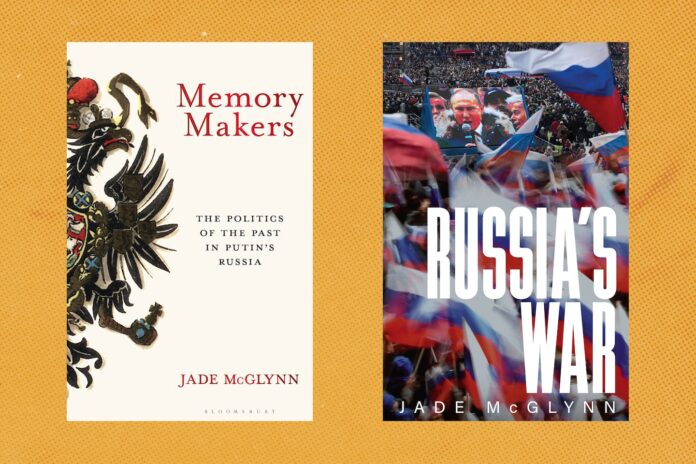To Western eyes, therefore, the invasion appeared to make no sense. But in two new books, Russia analyst Jade McGlynn presents a powerful and disturbing case that the invasion had a convincing historical logic to it, for Vladimir Putin and for Russians more generally. In “Memory Makers: The Politics of the Past in Putin’s Russia,” she argues that the invasion was “perhaps the only possible outcome of Russia’s preoccupation with policing the past.” In “Russia’s War,” she shows how deeply and fully the Russian people have accepted the historical narrative justifying this war. Taken together, the two books suggest that we have been looking in the wrong places to understand Russian motivations.
The Russian historical narrative, according to McGlynn, posits that when the state is strong and the people united, Russia achieves greatness, such as defeating Nazi Germany and launching Sputnik. When the state is weak and the people disunited, as under Boris Yeltsin, the West exploits and weakens Russia and its people. Russian media thus treat Western support for Ukraine not as a response to the invasion of Crimea in 2014 but as a long part of a Western “war” to keep Russia weak and therefore exploitable. Why else, Russians ask, would a debauched West support Ukrainian Nazis if not to use Ukraine as a proxy for perpetuating the West’s centuries-long quest to keep Russia weak and divided?
McGlynn argues that it is a mistake to dismiss this policing of the past as mere propaganda or brainwashing. She argues that the regime uses history to “develop cognitive filters and heuristics” that create comfortable spaces for framing the present. Key themes include the insistence that Ukraine has always been an extension of Russia, never a nation in its own right, and that the Russian state has played a key role in protecting the Russian people from the persistent existential dangers that lurk outside the country’s borders.
The Russian state has used a heavy hand to enforce its view of the past, firing or imprisoning many of those who disagree with it. But as McGlynn shows in “Russia’s War,” the most effective methods are much more subtle. What she describes as “agitainment” in television news and a tightly controlled internet blur the line between fact and fiction. Popular literature and entertaining feature films, many of them funded by the state or developed by influential figures including the media star Vladimir Solovyov and the former culture minister Vladimir Medinsky, promote “correct” historical themes such as Russian heroism and sacrifice. Multiple generations have internalized these narratives through school curriculums laden with tales of Western perfidy and historically grounded messianic narratives from the Russian Orthodox Church. This framing resonates with ordinary Russians, in part because it offers a heroic past to a people whose present and future are so precarious. It also offers a neat and tidy explanation (namely, the consistent enmity of the West) for Russia’s numerous shortcomings.
As McGlynn points out in “Memory Makers,” when history is rooted in an aberrant view of the past, the present is turned on its head. The Russian “heroes” fighting in Ukraine today are marching in the footsteps of the heroes of past generations and restoring Russia to the greatness that is — because of its glorious history — its true birthright. Russia becomes David, fighting the Goliath of Ukrainian Nazism masterminded by an all-powerful and incurably Russophobic West. History “proves” that the West is in terminal decline, while Russia is on a path to return to its natural position of global leadership. Russian soldiers are not agents of aggression and mass murder; rather, they are heroically defending Russians everywhere from a genocidal Ukrainian regime intent on killing them with bioweapons provided by the CIA. Taken to its illogical extreme, Russia is liberating Ukrainians from the degenerate Westerners tricking them into turning against their Russian brothers.
The war in Ukraine that McGlynn ruefully describes is therefore “Russia’s war,” not just Putin’s war. The Russian people, like those she came to know during her many years of studying Russia and living there, either support the war or at least identify with the historical justifications underpinning it. In the end, however, public support does not really matter. Unlike the West, where democratically elected leaders seek the support of the people they lead into war, Putin only needs their apathy or political neutrality. Their agreement with a common narrative of events is a more-than-adequate substitute for their active support.
In a tightly controlled dictatorship like Putin’s Russia, there is no possibility for an independent civil society to present alternative viewpoints, engage citizens in free discussion or search for sources to assess the government’s messaging. The result is not history as debate but history as a performative act of patriotism and a weaponized justification for an unprovoked war against a neighbor. As if to prove McGlynn’s point, historically based justifications for Russian policy and alleged plots by the West form terrifyingly explicit parts of Russia’s most recent National Security Strategy. Her insightful and creative analysis suggests that we are in for a long conflict not just over the fate of Ukraine, but also over how differing memories of the past will continue to shape the future.
Michael S. Neiberg is the chair of war studies and a professor of history at the U.S. Army War College in Carlisle, Pa. He is the author, most recently, of “When France Fell: The Vichy Crisis and the Fate of the Anglo-American Alliance.”
The Politics of the Past in Putin’s Russia
Bloomsbury Academic. 248 pp. $27
Polity. 264 pp. $19.95 (paperback)
A note to our readers
We are a participant in the Amazon Services LLC Associates Program,
an affiliate advertising program designed to provide a means for us to earn fees by linking
to Amazon.com and affiliated sites.



